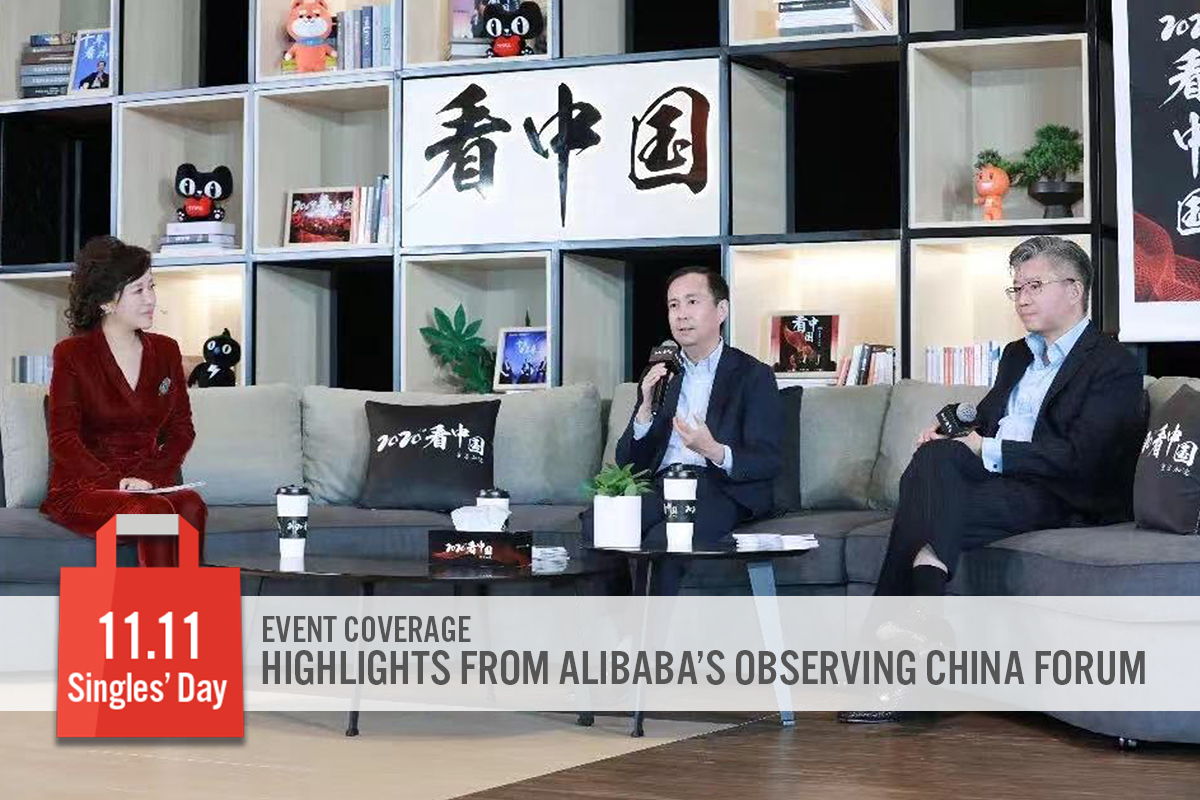
DIpil Das
Following another record-breaking Double 11, the Coresight Research team attended Alibaba’s Observing China Forum in Shanghai on November 16, 2020. The forum was organized by AliResearch, Alibaba’s research arm, and the School of Management of Fudan University. The event saw discussion of how digitalization accelerated due to Covid-19 and how brands and retailers are innovating to meet new consumer demands.
[caption id="attachment_119453" align="aligncenter" width="700"] Source: AliResearch[/caption]
Digital Transformation Is a Must for All Businesses
Many businesses had to rapidly adapt to the new environment amid Covid-19. Alibaba’s CEO Zhang Yong noted that the pandemic accelerated the digitalization trend in retail, which drove the success of Alibaba’s 11.11 Global Shopping Festival (also known as Singles’ Day) this year.
One example of digital transformation being widely adopted by merchants is the rise of livestreaming, which proved to be an effective and popular selling channel during Double 11. Almost 300 million consumers watched livestream sessions on Taobao Live during the shopping festival, and GMV from the platform amounted to twice that of last year’s event. Alibaba expects livestreaming e-commerce to exceed ¥1 trillion ($148.7 billion) in 2020.
Many traditional businesses have pivoted to livestreaming. Zuo Yan is a Taobao Live host who specializes in selling high-priced jewelry. She shared that her livestream sessions do not simply sell jewelry but also educate consumers on different types of jewelry and how to invest in quality pieces. Although jewelry remains a niche product category to sell via livestreaming, Zuo Yan’s channel achieved ¥100 million ($14.9 million) in GMV during Double 11.
[caption id="attachment_119452" align="aligncenter" width="700"]
Source: AliResearch[/caption]
Digital Transformation Is a Must for All Businesses
Many businesses had to rapidly adapt to the new environment amid Covid-19. Alibaba’s CEO Zhang Yong noted that the pandemic accelerated the digitalization trend in retail, which drove the success of Alibaba’s 11.11 Global Shopping Festival (also known as Singles’ Day) this year.
One example of digital transformation being widely adopted by merchants is the rise of livestreaming, which proved to be an effective and popular selling channel during Double 11. Almost 300 million consumers watched livestream sessions on Taobao Live during the shopping festival, and GMV from the platform amounted to twice that of last year’s event. Alibaba expects livestreaming e-commerce to exceed ¥1 trillion ($148.7 billion) in 2020.
Many traditional businesses have pivoted to livestreaming. Zuo Yan is a Taobao Live host who specializes in selling high-priced jewelry. She shared that her livestream sessions do not simply sell jewelry but also educate consumers on different types of jewelry and how to invest in quality pieces. Although jewelry remains a niche product category to sell via livestreaming, Zuo Yan’s channel achieved ¥100 million ($14.9 million) in GMV during Double 11.
[caption id="attachment_119452" align="aligncenter" width="700"] Source: AliResearch[/caption]
Digital transformation supported brick-and-mortar stores during coronavirus-led lockdowns and then helped retailers to recover quickly from Covid-19. For example, Belinda Wong, Chairman and CEO of Starbucks China, said that 80% of Starbucks stores were closed temporarily in the country earlier in the year due to Covid-19, but its business continued to operate through delivery fulfilled by Alibaba’s on-demand delivery platform Ele.me. In July, Starbucks introduced its mobile order-and-pay feature to multiple Alibaba apps—including Alipay, Taobao, local services platform Koubei and map provider Amap—to extend its reach to more Chinese consumers. In its fourth quarter of fiscal 2020 (ended September 27), Starbucks returned to sales growth, of 7%, and opened 259 new stores in China.
Brands and Retailers Need To Step Up To Meet Diverse Consumer Demand
Young consumers have become the driving force of consumption in China. Brands and retailers therefore need to revisit their current offerings to sharpen their appeal to younger generations.
Two Chinese drink brands, SaturnBird and Genki Forest, have recently innovated their product offerings to adapt to consumer demand:
Source: AliResearch[/caption]
Digital transformation supported brick-and-mortar stores during coronavirus-led lockdowns and then helped retailers to recover quickly from Covid-19. For example, Belinda Wong, Chairman and CEO of Starbucks China, said that 80% of Starbucks stores were closed temporarily in the country earlier in the year due to Covid-19, but its business continued to operate through delivery fulfilled by Alibaba’s on-demand delivery platform Ele.me. In July, Starbucks introduced its mobile order-and-pay feature to multiple Alibaba apps—including Alipay, Taobao, local services platform Koubei and map provider Amap—to extend its reach to more Chinese consumers. In its fourth quarter of fiscal 2020 (ended September 27), Starbucks returned to sales growth, of 7%, and opened 259 new stores in China.
Brands and Retailers Need To Step Up To Meet Diverse Consumer Demand
Young consumers have become the driving force of consumption in China. Brands and retailers therefore need to revisit their current offerings to sharpen their appeal to younger generations.
Two Chinese drink brands, SaturnBird and Genki Forest, have recently innovated their product offerings to adapt to consumer demand:
 Source: AliResearch[/caption]
Digital Transformation Is a Must for All Businesses
Many businesses had to rapidly adapt to the new environment amid Covid-19. Alibaba’s CEO Zhang Yong noted that the pandemic accelerated the digitalization trend in retail, which drove the success of Alibaba’s 11.11 Global Shopping Festival (also known as Singles’ Day) this year.
One example of digital transformation being widely adopted by merchants is the rise of livestreaming, which proved to be an effective and popular selling channel during Double 11. Almost 300 million consumers watched livestream sessions on Taobao Live during the shopping festival, and GMV from the platform amounted to twice that of last year’s event. Alibaba expects livestreaming e-commerce to exceed ¥1 trillion ($148.7 billion) in 2020.
Many traditional businesses have pivoted to livestreaming. Zuo Yan is a Taobao Live host who specializes in selling high-priced jewelry. She shared that her livestream sessions do not simply sell jewelry but also educate consumers on different types of jewelry and how to invest in quality pieces. Although jewelry remains a niche product category to sell via livestreaming, Zuo Yan’s channel achieved ¥100 million ($14.9 million) in GMV during Double 11.
[caption id="attachment_119452" align="aligncenter" width="700"]
Source: AliResearch[/caption]
Digital Transformation Is a Must for All Businesses
Many businesses had to rapidly adapt to the new environment amid Covid-19. Alibaba’s CEO Zhang Yong noted that the pandemic accelerated the digitalization trend in retail, which drove the success of Alibaba’s 11.11 Global Shopping Festival (also known as Singles’ Day) this year.
One example of digital transformation being widely adopted by merchants is the rise of livestreaming, which proved to be an effective and popular selling channel during Double 11. Almost 300 million consumers watched livestream sessions on Taobao Live during the shopping festival, and GMV from the platform amounted to twice that of last year’s event. Alibaba expects livestreaming e-commerce to exceed ¥1 trillion ($148.7 billion) in 2020.
Many traditional businesses have pivoted to livestreaming. Zuo Yan is a Taobao Live host who specializes in selling high-priced jewelry. She shared that her livestream sessions do not simply sell jewelry but also educate consumers on different types of jewelry and how to invest in quality pieces. Although jewelry remains a niche product category to sell via livestreaming, Zuo Yan’s channel achieved ¥100 million ($14.9 million) in GMV during Double 11.
[caption id="attachment_119452" align="aligncenter" width="700"] Source: AliResearch[/caption]
Digital transformation supported brick-and-mortar stores during coronavirus-led lockdowns and then helped retailers to recover quickly from Covid-19. For example, Belinda Wong, Chairman and CEO of Starbucks China, said that 80% of Starbucks stores were closed temporarily in the country earlier in the year due to Covid-19, but its business continued to operate through delivery fulfilled by Alibaba’s on-demand delivery platform Ele.me. In July, Starbucks introduced its mobile order-and-pay feature to multiple Alibaba apps—including Alipay, Taobao, local services platform Koubei and map provider Amap—to extend its reach to more Chinese consumers. In its fourth quarter of fiscal 2020 (ended September 27), Starbucks returned to sales growth, of 7%, and opened 259 new stores in China.
Brands and Retailers Need To Step Up To Meet Diverse Consumer Demand
Young consumers have become the driving force of consumption in China. Brands and retailers therefore need to revisit their current offerings to sharpen their appeal to younger generations.
Two Chinese drink brands, SaturnBird and Genki Forest, have recently innovated their product offerings to adapt to consumer demand:
Source: AliResearch[/caption]
Digital transformation supported brick-and-mortar stores during coronavirus-led lockdowns and then helped retailers to recover quickly from Covid-19. For example, Belinda Wong, Chairman and CEO of Starbucks China, said that 80% of Starbucks stores were closed temporarily in the country earlier in the year due to Covid-19, but its business continued to operate through delivery fulfilled by Alibaba’s on-demand delivery platform Ele.me. In July, Starbucks introduced its mobile order-and-pay feature to multiple Alibaba apps—including Alipay, Taobao, local services platform Koubei and map provider Amap—to extend its reach to more Chinese consumers. In its fourth quarter of fiscal 2020 (ended September 27), Starbucks returned to sales growth, of 7%, and opened 259 new stores in China.
Brands and Retailers Need To Step Up To Meet Diverse Consumer Demand
Young consumers have become the driving force of consumption in China. Brands and retailers therefore need to revisit their current offerings to sharpen their appeal to younger generations.
Two Chinese drink brands, SaturnBird and Genki Forest, have recently innovated their product offerings to adapt to consumer demand:
- SaturnBird was founded in 2015. The brand created a new category in the coffee market called specialty instant coffee, which uses “cold extraction” innovation and high-quality ingredients to provide consumers with flavorful and convenient coffee. Wu Jun, Founder of SaturnBird, said that the brand was the top seller in the instant-coffee category on Tmall during Double 11, and the company reached its GMV goal of ¥100 million ($14.9 million).
- Genki Forest was the bestseller within the beverage category on Tmall this Singles’ Day. The brand offers flavored sparkling water with zero sugar and zero calories to cater to health-conscious young consumers. Zhang Shaoyang, COO of Genki Forest, shared that by analyzing consumer data on Tmall, the company was able to identify consumer demand for tasty yet healthy milk-tea products. Genki Forest used natural sweeteners to develop a sugar-free, low-fat milk tea to meet this demand and differentiate its brand from competitors.